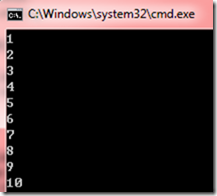c++ primer学习笔记(6)-函数(2)
2011-02-24 20:44 Clingingboy 阅读(312) 评论(0) 收藏 举报
一.默认实参
string screenInit(string::size_type height = 24,
string::size_type width = 80,
char background = ' ' );
要么全有,要么全没有.
调用
string screen;
screen = screenInit(); // equivalent to screenInit (24,80,' ')
screen = screenInit(66); // equivalent to screenInit (66,80,' ')
screen = screenInit(66, 256); // screenInit(66,256,' ')
screen = screenInit(66, 256, '#');
二.函数静态局部变量
这个变量定义于函数中,但生命周期却跨越了函数,对象一旦被创建,直至程序结束前才被撤销
size_t count_calls()
{
static size_t ctr = 0; // value will persist across calls
return ++ctr;
}
int main()
{
for (size_t i = 0; i != 10; ++i)
cout << count_calls() << endl;
return 0;
}
输出:
三.内联函数
一个函数前面加上inline关键字,则成为内联函数.
特性:将函数展开,消除函数调用的额外开销(提高性能),适用于调用次数多,代码精湛的
四.返回值
1.非引用返回
int Max(int &a,int &b)
{
if(a>b)
return a;
return b;
}
Test
int a=10;
int b=20;
int c=Max(a,b);
int *d=&b;
int *e=&c;
bool f=d==e;
cout << f << endl;
输出0,地址不同
2.返回引用
int &Max2(int &a,int &b)
{
if(a>b)
return a;
return b;
}
唯一的变化就是返回值变了
重新测试
int a=10;
int b=20;
int &c=Max2(a,b);
int *d=&b;
int *e=&c;
bool f=d==e;
cout << f << endl;
返回1,地址相同
3.不要返回函数局部对象的引用
当函数执行完毕后,将要对布局对象进行释放





 浙公网安备 33010602011771号
浙公网安备 33010602011771号